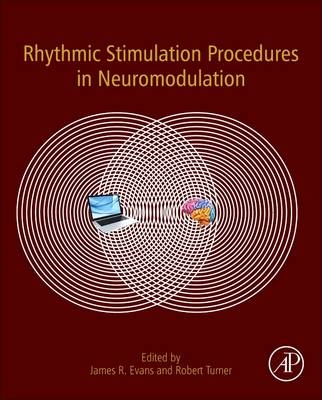
Rhythmic Stimulation Procedures in Neuromodulation
Academic Press Inc (Verlag)
978-0-12-803726-3 (ISBN)
Each technique chapter provides a detailed description of the procedure, a rationale for application with specific populations, discussion of similarities/differences relative to other approaches, and support for efficacy. This volume offers readers a historical overview of the roles of rhythm and dysrhythmia in health and disease, including examples of past and present therapeutic uses of rhythmic stimulation, entrainment, and/or modification. It also facilitates speculation about potential developments in rhythm-related methods for the future of mental health. Few books published in the general area of rhythm have focused on the scientific study of the significance of biological rhythms.
Dr. James Evans is licensed in clinical and school psychology. Following graduation with a bachelor's degree in education, and a tour of duty in the U.S. Army, he taught in a public high school. Later he earned a master's degree in psychology. After working for six years at a state hospital and a county mental health center, he attended Peabody College of Vanderbilt University where he received a Ph.D. degree in psychology. He was on the faculty of the Psychology Department at the University of South Carolina for thirty years, and is retired from that position. He has completed postdoctoral work in neuropsychology at the University of California at San Francisco, the University of Georgia and the Medical College of Georgia. For over thirty years he also has maintained a successful private practice involving working with children and adults in hospital, school, prison, and private office settings. He has expertise in psychological, neuropsychological and psychoeducational assessment, as well as years of experience in psychotherapy and neurotherapy. He is the author of thirty-five journal articles and nine book chapters, and editor or co-editor of ten psychology-related books, including Rhythmic Stimulation Procedures for Neuromodulation (2017) and Neurofeedback: The First Fifty Years ( 2019). Presently he is self-employed as a psychologist at the Sterlingworth Center in Greenville, SC. Dr. Robert Turner is currently the owner and CEO of Network Neurology in Charleston SC. He is also Associate Clinical Professor of Neurosciences at the Medical University of South Carolina in Charleston, as well as an Associate Researcher with the MIND Research Institute in Irvine CA. Dr Turner maintains a full-time clinical, teaching, and neurophysiology practice with patients throughout the southeastern region of the United States. While continuing full time work at MUSC since 1997, he obtained a Master’s degree in clinical research (epidemiology & biostatistics) in 2003 in the MUSC College of Graduate Studies, and has since then been actively involved in ongoing clinical research with collaborative studies in non-invasive neurostimulation and neuromodulation techniques as well as advanced techniques of EEG source analysis. Current research involves collaborating with colleagues in Charleston, Cape Town, South Africa, Mexico City, Bejing, and with several academic practices throughout the United States. Dr Turner began as a music and foreign language major in college, changing over to pre-medicine in his 3rd year. During medical school, he also pursued Master’s training in Piano Performance at the University of Nebraska at Omaha Graduate School. After Medical School, his postgraduate training consisted of internship/residency in Pediatrics followed by two fellowships, one in Adult/Child Neurology, and the second in Clinical Neurophysiology/EMG/Neuromuscular Disorders, and his current clinical/research emphases are pediatric epilepsy/epileptogenesis, the non-linear effects of auditory and music stimulation on the brain, as well as neuromodulation techniques. He continues to pursue his love of music, and is an accomplished classical pianist. He has received numerous awards and honors in Charleston over the past 16 years, including multiple Faculty Excellence Awards for teaching, AREA Awards for excellence in ambulatory care, Golde Apple Nominations and Awards, and double honors in humanism with the AAMC Humanism in Medicine Award and the Leonard Tow Humanism in Medicine AwardDr. Turner is multiply Board-Certificated by the National Board of Medical Examiners, became a certified member of the American Society of Neurorehabilitation in 1992, and has eight medical specialty boards certifications:1. American Board of Psychiatry and Neurology With Special Qualification in Child Neurology,2. American Board of Pediatrics,3. American Board of Electrodiagnostic Medicine, 4. American Board of Clinical Neurophysiology,5. American Board of Psychiatry and Neurology With Added Qualification in Clinical Neurophysiology,6. American Board of Psychiatry and Neurology With Added Qualification in Neurodevelopmental Disabilities ,7. Quantitative Electroencephalograpy (QEEG) Certification Board, and8. American Board of Psychiatry and Neurology With Added Qualification in Epilepsy.
1. Historical Overview of Rhythmic Stimulation Procedures in Health and Disease
2. Cranio-electro Stimulation: an effective yet simple technique for calming the mind
3. Audio-Visual Entrainment
4. Color- and Light-Based Modulation of Brain Activity
5. Nexalin and Related Forms of Subcortical Electrical Stimulation
6. The Use of Music for Neuromodulation
7. Non-invasive transcranial magnetic and electrical stimulation: Working mechanisms
8. Toward a Frequency-Based Theory of Neurofeedback
9. Cultural Factors in Response to Rhythmic Stimuli
10. Speculation on the Nature and Future of Rhythmic Stimulation
| Erscheinungsdatum | 05.07.2017 |
|---|---|
| Verlagsort | San Diego |
| Sprache | englisch |
| Maße | 191 x 235 mm |
| Gewicht | 930 g |
| Themenwelt | Medizin / Pharmazie ► Medizinische Fachgebiete ► Neurologie |
| Naturwissenschaften ► Biologie ► Humanbiologie | |
| Naturwissenschaften ► Biologie ► Zoologie | |
| ISBN-10 | 0-12-803726-1 / 0128037261 |
| ISBN-13 | 978-0-12-803726-3 / 9780128037263 |
| Zustand | Neuware |
| Haben Sie eine Frage zum Produkt? |
aus dem Bereich


